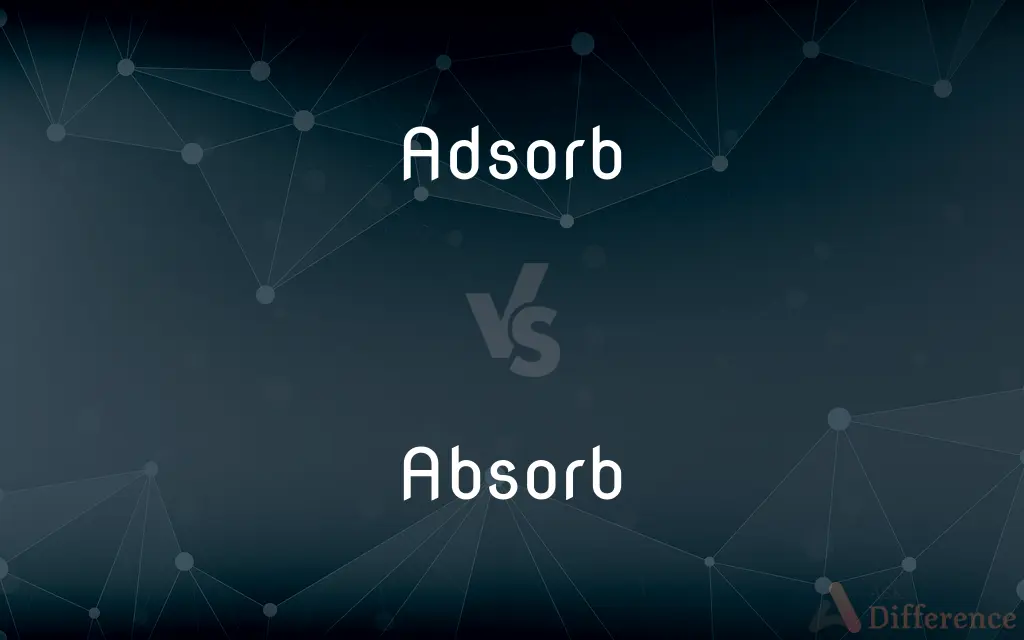Adsorb vs. Absorb — What's the Difference?
By Tayyaba Rehman — Updated on October 5, 2023
Adsorb means to gather on a surface in a condensed layer, while Absorb means to take in or soak up. They refer to surface and bulk processes, respectively.

Difference Between Adsorb and Absorb
Table of Contents
ADVERTISEMENT
Key Differences
Adsorb and Absorb, though similar-sounding, serve distinct functions. Adsorb refers to the process where molecules, atoms, or ions adhere to the surface of another substance. It's a surface phenomenon. For instance, activated carbon can adsorb certain impurities from water, implying the impurities stick to the carbon's surface.
On the other hand, Absorb refers to the process where one substance is taken into the volume of another substance. It's an entire volume phenomenon. A classic example is a sponge, which can absorb water, meaning it soaks up the water into its volume.
To further illustrate, consider a gas like carbon dioxide. If it adheres to the surface of a solid material, it's adsorbed. If it's dissolved completely in a liquid, it's absorbed. Both processes are essential in various scientific and industrial applications, with adsorption commonly used in purification processes and absorption in various chemical processes.
Another distinction between the two terms is their etymology. While both have roots in the Latin verb 'sorbēre', meaning 'to drink' or 'suck up', the prefixes 'ad-' and 'ab-' determine the direction of the action. 'Ad-' implies a motion toward or onto something, which aligns with Adsorb's surface-level action. 'Ab-' suggests a movement away or apart, in line with Absorb's encompassing action.
Comparison Chart
Process
Surface accumulation
Bulk uptake
ADVERTISEMENT
Usage
Adhesion of molecules onto surfaces
Soaking up or taking in
Examples
Activated carbon adsorbing impurities
Sponge absorbing water
Phenomenon
Surface phenomenon
Volume phenomenon
Etymology
From Latin 'ad-' (towards)
From Latin 'ab-' (away from)
Compare with Definitions
Adsorb
Adhesion in an extremely thin layer.
Toxins adsorb onto the filter's surface.
Absorb
To engross or engage wholly.
He was absorbed in his work.
Adsorb
To bind molecules or particles to a surface.
Activated charcoal can adsorb gases.
Absorb
Take in or soak up (energy or a liquid or other substance) by chemical or physical action
Buildings can be designed to absorb and retain heat
Steroids are absorbed into the bloodstream
Adsorb
Surface retention of a substance.
Certain materials adsorb light wavelengths.
Absorb
Take up the attention of (someone); interest greatly
She sat in an armchair, absorbed in a book
The work absorbed him and continued to make him happy
Adsorb
Accumulation at a boundary or interface.
Contaminants adsorb onto clay particles.
Absorb
To take (something) in through or as through pores or interstices.
Adsorb
Gathering on a surface in a condensed layer.
Oils can adsorb pollutants from water.
Absorb
To occupy the attention, interest, or time of; engross
The problem completely absorbed her.
Adsorb
(of a solid) hold (molecules of a gas or liquid or solute) as a thin film on the outside surface or on internal surfaces within the material
The dye is adsorbed on to the fibre
Absorb
To take up or occupy (one's time or interest, for example).
Adsorb
To take up by adsorption.
Absorb
To retain (radiation or sound, for example) wholly, without reflection or transmission.
Adsorb
To accumulate on a surface, by adsorption
The gas was purified by adsorbing the impurities onto active carbon.
Absorb
To take in; assimilate
Immigrants who were absorbed into the social mainstream.
Adsorb
To attract and bind (molecules of a substance in a fluid) so as to form a thin layer on the surface, by non-electrostatic forces; to bind by adsorption. Distinguished from absorb, in which the foreign substance penetrates the body of the absorbing material.
Absorb
To learn; acquire
"Matisse absorbed the lesson and added to it a new language of color" (Peter Plagen).
Adsorb
Accumulate (liquids or gases) on the surface
Absorb
To receive (an impulse) without echo or recoil
A fabric that absorbs sound.
A bumper that absorbs impact.
Absorb
To assume or pay for (a cost or costs).
Absorb
To endure; accommodate
Couldn't absorb the additional hardships.
Absorb
To use up; consume
The project has absorbed all of our department's resources.
Absorb
(transitive) To include so that it no longer has separate existence; to overwhelm; to cause to disappear as if by swallowing up; to incorporate; to assimilate; to take in and use up.
Absorb
To engulf, as in water; to swallow up.
Absorb
(transitive) To suck up; to drink in; to imbibe, like a sponge or as the lacteals of the body; to chemically take in.
Absorb
(intransitive) To be absorbed, or sucked in; to sink in.
The drops of water slowly absorbed into the dry sponge.
Absorb
To take in energy and convert it.
Heat, light, and electricity are absorbed in the substances into which they pass.
Absorb
In receiving a physical impact or vibration without recoil.
Absorb
In receiving sound energy without repercussion or echo.
Absorb
Taking in radiant energy and converting it to a different form of energy, like heat.
Absorb
(transitive) To engross or engage wholly; to occupy fully.
Absorb
(transitive) To occupy or consume time.
Absorb
(transitive) To assimilate mentally.
Absorb
To assume or pay for as part of a commercial transaction.
Absorb
(transitive) To defray the costs.
Absorb
(transitive) To accept or purchase in quantity.
Absorb
To swallow up; to engulf; to overwhelm; to cause to disappear as if by swallowing up; to use up; to include.
The large cities absorb the wealth and fashion.
Absorb
To suck up; to drink in; to imbibe; as a sponge or as the lacteals of the body.
Absorb
To engross or engage wholly; to occupy fully; as, absorbed in study or the pursuit of wealth.
Absorb
To take up by cohesive, chemical, or any molecular action, as when charcoal absorbs gases. So heat, light, and electricity are absorbed or taken up in the substances into which they pass.
That grave question which had begun to absorb the Christian mind - the marriage of the clergy.
Too long hath love engrossed Britannia's stage,And sunk to softness all our tragic rage.
Should not the sad occasion swallow upMy other cares?
And in destruction's riverEngulf and swallow those.
Absorb
Become imbued;
The liquids, light, and gases absorb
Absorb
Take up mentally;
He absorbed the knowledge or beliefs of his tribe
Absorb
Take up, as of debts or payments;
Absorb the costs for something
Absorb
Take in, also metaphorically;
The sponge absorbs water well
She drew strength from the minister's words
Absorb
Cause to become one with;
The sales tax is absorbed into the state income tax
Absorb
Suck or take up or in;
A black star absorbs all matter
Absorb
Engross (oneself) fully;
He immersed himself into his studies
Absorb
Assimilate or take in;
The immigrants were quickly absorbed into society
Absorb
Engage or engross wholly;
Her interest in butterflies absorbs her completely
Absorb
To take in or soak up by chemical or physical action.
Plants absorb sunlight.
Absorb
To assimilate or incorporate into a larger entity.
The company absorbed its competitor.
Absorb
To reduce the intensity of transmitted sound or light.
Thick curtains absorb noise.
Absorb
To consume all of one's attention or time.
The novel absorbed her all evening.
Common Curiosities
Is adsorption a surface or volume phenomenon?
Adsorption is a surface phenomenon.
How does a sponge demonstrate absorption?
A sponge soaks up water, taking it into its entire volume, demonstrating absorption.
Is there a connection between the terms in Latin?
Yes, both originate from 'sorbēre', meaning 'to drink', but their prefixes 'ad-' and 'ab-' indicate direction.
What's a common use of adsorption?
Adsorption is commonly used in purification processes, like water filters using activated carbon.
Which is a bulk process, Adsorb or Absorb?
Absorb is a bulk process.
How does Absorb differ from Adsorb?
Absorb is about taking in or soaking up, while Adsorb is about molecules adhering to surfaces.
Can gases be adsorbed?
Yes, gases can be adsorbed onto solid surfaces, like carbon dioxide on activated carbon.
Can something be partially adsorbed?
Yes, partial adsorption can occur, with only a fraction of molecules sticking to a surface.
Can a material both adsorb and absorb?
Yes, some materials can both adsorb substances onto their surface and absorb them into their volume.
Can light be adsorbed or absorbed?
Light can be both adsorbed (surface interaction) and absorbed (taken into a medium's volume).
How does absorption relate to concentration?
In chemistry, a higher concentration often means more of a substance can be absorbed.
What does Adsorb refer to?
Adsorb refers to the process where molecules stick to the surface of another substance.
Are Adsorb and Absorb interchangeable in usage?
No, they refer to different processes and aren't interchangeable.
Are adsorption and absorption passive processes?
Not always. While they can be passive, external factors like pressure or temperature can influence them.
Is absorption always about liquids?
No, absorption can also refer to light, sound, or other entities being taken in.
Share Your Discovery

Previous Comparison
Themself vs. Themselves
Next Comparison
Cupidity vs. AvariceAuthor Spotlight
Written by
Tayyaba RehmanTayyaba Rehman is a distinguished writer, currently serving as a primary contributor to askdifference.com. As a researcher in semantics and etymology, Tayyaba's passion for the complexity of languages and their distinctions has found a perfect home on the platform. Tayyaba delves into the intricacies of language, distinguishing between commonly confused words and phrases, thereby providing clarity for readers worldwide.














































